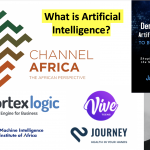4 ways artificial intelligence is transforming African industries and communities
https://www.businessinsider.co.za/5-ways-scientists-are-teaching-robots-to-transform-the-african-industries-they-work-in-from-depression-chatbots-to-diagnosing-eye-diseases-2019-8
- Smart-technology entrepreneur Jacques Ludik says developers are coming up with incredible ways of teaching robots to transform African industries and communities.
- While many people see robots as a potential threat to jobs, Ludik believes AI holds the key to uplifting communities.
- He gave us a list of inspirational AI innovations to back it up.
- For more stories, go to Business Insider South Africa.
From depression chatbots to diagnosing eye diseases, developers are coming up with incredible ways of teaching robots to transform the African industries they work in.
So says smart technology entrepreneur Jacques Ludik, founder of AI company Cortex Group and of the Machine Intelligence Institute of Africa.
“We’re seeing ground-breaking innovations taking place, not only on a business level, but on a community level.”
According to Ludik, artificial intelligence could be the powerful tool Africa needs to tackle its challenges, suck as shortcomings in health, education or employment.
While many people see robots as a potential threat to jobs, Ludik believes AI holds the key to uplifting communities, through education and economic development.
“Education is key to bridging the increasing gap of our experiences of the world, and improve and increase access to jobs (and other services) that aren’t bound by geography. AI, the very technology that is moving the rest of the world forward so rapidly, has the power to do that.”
AI is only as strong as the human behind it, and Ludik wants more people, and especially young people, to dive into the complex world of algorithms in order solve challenges in their communities.
Ludik gave us four examples where AI is breaking down barriers in Africa and transforming industries:
AI that can diagnose retinal diseases for free.
Nigerian-born Stephen Odaibo is using AI to better diagnose and treat retinal diseases using images of the retina, and to classify the type and stage of retinal disease, enabling better treatment.
His company RETINA-AI is training algorithms to classify the type and stage of the retinal disease.
“This could have a major impact in South Africa where blindness is a condition that severely impacts life opportunities,” said Ludik.
Odaibo is trying to address a major shortage of retinal specialists in the world.
A year ago the company released a mobile app for eye-care providers, which is free on the iStore.
Jobs teaching AI in Cape Town townships.
For machines to learn what they are seeing – be it an apple, a bottle of water or a shark – they need humans to label data first. That is a time-consuming process that requires humans to manually label objects over and over again, thousands if not tens of millions of times, depending on how sophisticated the AI is needed to be.
Initiated by Pieter Boon of Cape Town AI, Enlabeler is a data labelling platform powered by people living in Khayelitsha, Cape Town.
“Its strong social upliftment credentials, allied to job creation and learning, are ground-breaking and could create thousands of jobs,” said Ludik.
Community development through schools in South Africa.
AI in Africa‘s aim is to expose children to technology using practical, hands-on learning in the disciplines of AI, robotics, virtual reality (VR), and the internet of things (IoT).
It forms part of the EduK∞ (Educate) Initiative, which is a social impact programme of the Kgalema Motlanthe Foundation and Fliptin Venture Builders, with the support of other partners.
“Without knowledge and education, nothing can change. I believe that initiatives like these are the right steps towards socio-economic development and inclusion. No sector or community must be left behind – we need more forward-thinkers and community leaders with a passion for and understanding of AI and how it can, not disrupt, but change lives,’ said Ludik.
AI battling depression and anxiety.
Woebot is a mental health chatbot originally designed to interact with students showing signs of depression and anxiety. Since launch it has seen even engagement from users ranging from 16 to 102-years-old. The chatbot offers a 24/7 helpline to discuss how you feel and is currently being used in over 120 countries, including South Africa and Nigeria.
It was developed by Stanford psychologist and healthcare designer Alison Darcy, who wanted to addresses growing mental health concerns around the world.
The AI sends over a million messages per week to help users with everyday stress and challenges such as symptoms of depression, anxiety, relationship problems, procrastination, loneliness, grief, addiction, pain management.
It checks in with you every day and guides you through practical techniques based on tried and tested approaches such as cognitive behavioural therapy, mindfulness, and dialectical behaviour therapy.




